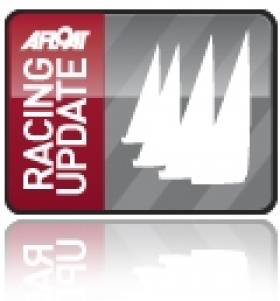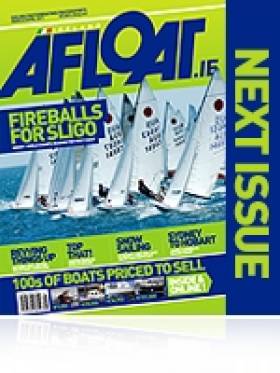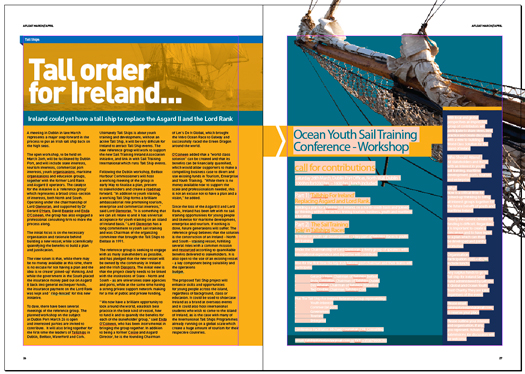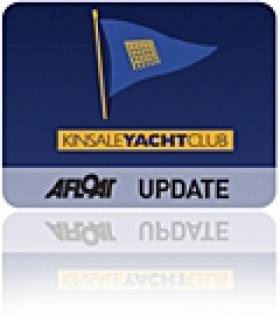Displaying items by tag: Sovereigns
Lyver Race Report - Holyhead to Howth
Following very closely after the Dingle Race, ICRA Nationals in Crosshaven and the Sovereign's Cup in Kinsale, it was understandable that the numbers of ISORA boats taking part in the Lyver Race was small. The "grim" forecast of no wind did not encourage any boats to take part either. Never the less, five ISORA boats joined the 10 other boats and came to the start shortly after 19.00 on Friday the 1st July.
In view of the forecast the Sailing Committee shortened the race to the minimum requirements of RORC to qualify for the Fastnet Race – 75 miles. The time limit for the race was 24 hours after the start. With little wind at the start, and a north going tide just starting, they chose a "waypoint" just south of the Isle of Man as the turning mark and then to Howth.
This decision turned out to be inspired. The little wind there was there at the start was from the north-west so the first leg was a beat to the waypoint. Those boats who took the north leg from the start shot away in the tide while the others appeared to remain static in
Holyhead Bay. The forecast was for the wind to veer around to the south later. All through the night the winds were very fickle and boats had the chase constantly fluctuating breezes. Despite the little wind, it held for most of the night. At day break the wind started to pick up from the forecasted South and boats popped their kites and headed for the waypoint. There was a great gathering of boats at the waypoint with 12 boats visible around the waypoint.
The next leg to Howth was a white sail reach. This turned out to be an intensive chase with the J111 "Arabella" taking the lead followed by two Prima 38's, Stephen Tudor's "Sgrech" and Matt Davis's " Raging Bull". The wind from the south increased in strength as the fleet approached Howth.
While "Arabella" took line honours, it only managed to take 2nd place overall. "Sgrech" took 1st place and "Raging Bull" took 3rd place. All the boats that had not retired, managed to complete the course within the time limit.
The boats taking part in the race were fitted with trackers. The progress of the race can be followed by clicking the following link: http://live.adventuretracking.com/lyver2011
The prize-giving took place in Howth Yacht Club on Saturday evening.
Irish Champion Tiger Heading for Cowes Quarter Ton Cup
Recently crowned ICRA IRC Three Champion, Tiger (George Kenefick) is travelling to Cowes for next week's 2011 Coutts Quarter Ton Cup hosted by the Royal Corinthian Yacht Club in Cowes, and with only a week to go, anticipation is building amongst the international fleet signed up to compete.
The black hulled champion won its class at the ICRA Nationals in Crosshaven and was second in IRC a week later at the Sovereign's Cup in Kinsale. Tiger was also second in Kinsale's newly established Quarter Ton Cup. The boat is Ireland's sole entry in the event.

Cork's Tiger is heading for Cowes and next week's Quarter Ton Cup. Photo: Bob Bateman
This is the seventh running of the event since the spectacular revival of the Quarter Ton Class back in 2005, and in addition to the core of regular domestic Quarter Ton Class aficionados who flock to Cowes each year, this year entries have also been received from France and the Netherlands, as well as from as far afield as Russia and New Zealand.
Following an afternoon of registration on Sunday 10th July and the Coutts Welcome Reception at Royal Corinthian Yacht Club that evening, racing will get underway on Monday 11th July and run through until Wednesday 13th July, with three races scheduled to take place each day. Racing will be run under the IRC handicapping system, enabling boats designed to all three versions of the Quarter Ton Class rule to compete as a single fleet.
Afloat's March/April Issue Out Next Week!
Is there no end to the achievements of Irish boaters against seemingly impossible odds?
The winter may have been a time of hibernation for some of us but as the stories in Afloat's March/April issue will bear out Irish sailors have been battling the elements all winter long.
James Carroll competed in January's Sydney-Hobart offshore race and, much closer to home, Paul A. Kay journeyed through snow and ice in December from Dun Laoghaire to a new marina on Valentia Island.
As if to prove a point that we're down but not out, a winter of results on foreign waters includes a win in the Mirror World Championships in Australia and a top Olympic result in Florida, USA.
They are gutsy performances from youth teams that shows, if nothing else, the next generation of Irish sailors is really up for a fight. All this plus lots, lots more on news-stands next week!
Selected contents from Ireland's only boating magazine include:
News
Surveyors Issue Boat Launch Warning, Buoyant Dinghies Buck the Market, Ice Diving in Ireland, German U-Boat Rediscovered in Cork Harbour, an Historic Trophy for South Pacific Dream Cruise, MGM open in Cork, Hugh Mockler joins Crosshaven Boatyard plus lots, lots more.
News Focus
A new masterplan for Dun Laoghaire harbour is badly needed but it needs buy in from all those that use it
Going Offshore
The tenth Dun Laoghaire to Dingle offshore race was launched in style
Marine Conference
Combating the downturn was the focus of a unique marine gathering on both sides of the Irish sea.

Gear Review
New dinghy gear, a new Crosshaven boot from Dubarry, a new raincoat for girls and an upgrade for Musto's MPX.
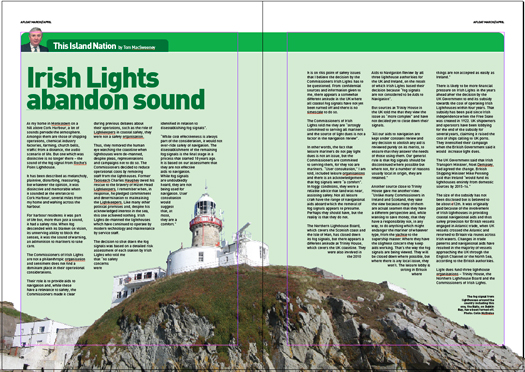
This Island Nation
The decision to shut down the fog signals was based on a detailed risk assessment. Tom MacSweeney on the loss of fog horns
Sailor of the Year
Anthony O'Leary of Cork is the Afloat.ie/Irish Independent "Sailor of the Year" in celebration of his outstanding achievements afloat nationally and internationally.
Tall Ships
W M Nixon looks at the realities of national sail training in the 21st Century.
Tall Ship Conference
Ireland could yet have a tall ship to replace the Asgard II and the Lord Rank, if a new group formed to press for a replacement is successful
Racing update
Ulstermen's World Title, Topper worlds for Dun Laoghaire, Two Irish campaigns line up for Figaro Race, SB3 Sailors Cry Foul at Dun Laoghaire Parking Fees and an Irish entry in the Moth worlds in Australia, Irish Mini 6.50 Campaign in Prospect.
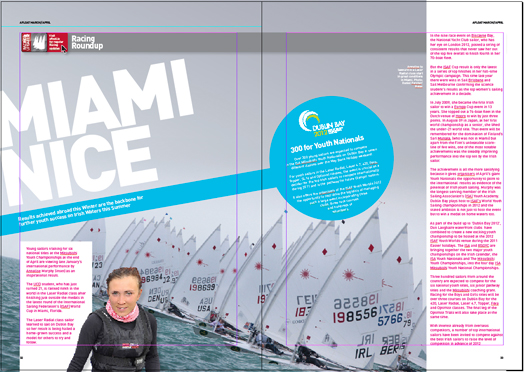
Youth Worlds preview
Results achieved abroad this Winter are the backbone for further Irish youth
success
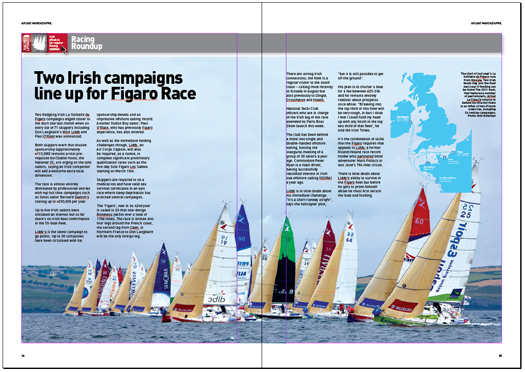
Figaro Preview
Two fledgling Irish La Solitaire du Figaro campaigns edged closer to the start line last month
Volvo Dun Laoghaire Regatta
Volvo Dun Laoghaire regatta has taken in 22 entries six months ahead of the first race of the biggest regatta in Irish sailing.
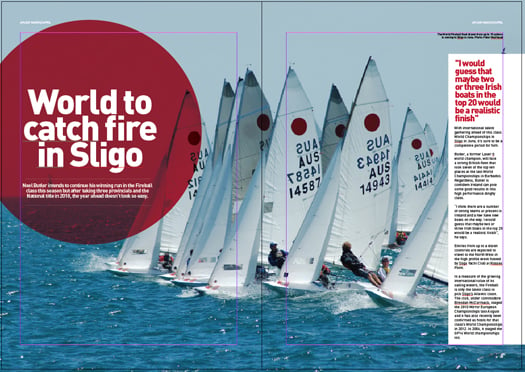
Fireball Worlds preview
Dun Laoghaire's Noel Butler intends to continue his winning run in the Fireball class this season but the year ahead doesn't look so easy as the World Championships come to Sligo
Sovereigns cup preview
Up to 30 Quarter tonners will be at the Sovereigns Cup this year including one from New Zealand.
Shiver to deliver
A journey through snow and ice from Dun Laoghaire to Valentia Island
Sydney-Hobart Race
Outside of the Volvo Ocean Race, the Sydney Hobart is one of the world's most challenging offshore races. James Carroll Raced it in January.
Inland
As the cuts begin to bite, it may be time to look at the British direction for our waterways, writes Brian J Goggin
Dubarry Nautical Crossword
Soundings
A Google aerial photo proves useful navigating for Baldoyle Estuary
- Anthony O'Leary
- Dun Laoghaire
- Tom MacSweeney
- Harbour
- MGM Boats
- Asgard II
- World Championships
- Dinghies
- Olympic
- Cork Harbour
- Valentia
- Mirror
- Dingle
- youth
- Lord Rank
- Island Nation
- Hugh Mockler
- Dubarry
- Tall ship
- brokerage
- sydneyhobart
- fog horn
- moth
- Mini 6.50
- Uboat
- Fireball worlds
- Sovereigns
- James Carroll
- Paul A. Kay
- Crosshaven Boatyard
- Baldoyle
- MPX
- W M Nixon
Photography from 2007 Soveriegn's Cup
A remarkable performance throughout all 8 races by John Twomey and his team aboard Shillelagh resulted in a clear victory in division 3 IRC by a margin of some 12 points to swoop the coveted Sovereign's Cup.
Dave O'Sullivan served as Regatta Director for Sovereigns Cup 2007 in Kinsale Yacht Club.
Bob Bateman's photos of Sovereign's Cup 2007 are BELOW.



























